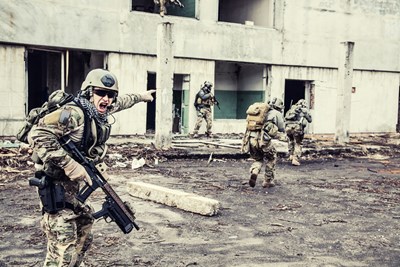The role of translators in international conflict
Saturday 10 October 2015

In the theatre of modern war and international conflict, translators and interpreters play a multi-faceted, complex and highly significant role. Translators are able to broaden and clarify people’s understanding of a conflict to which they are nowhere near, and help bring some comprehension to a situation often many hundreds of miles away. Guiding understanding, communication and action both within and outside of the war zone, translators embed themselves into the situation in order to deliver public and political narratives on conflicts.
Powerful, financially stable organisations like governmental bodies and the media use translators as well as operations such as peacekeepers, humanitarians and activists who have little to no funding and possibly no access to the wider media outlets either.
Translators as mediators
In times of conflict, it is often the translator who plays the role of mediator as all parties attempt to justify and legitimise their actions. In the modern day’s disruptive world of civil and international unrest where conflict isn’t merely confined to isolated locales, this role becomes essential.
Translators as soldiers
It is not uncommon to see translators positioned on the ground directly facing the war itself. Translators can find themselves witnessing significant loss of life and sometimes even taking part in conflict directly. The military need to rely on civilian translators for their language skills and cultural knowledge which means these translators are often in a duplicitous role as interpreter and soldier, working alongside international journalists and military linguists, positioned directly amidst conflicts.
Translators as advocates
Operating at safer distances, there are translators who are working on war propaganda, and intelligence data and advocating in courtroom translations on behalf of victims and defendants of conflicts. Translators will also be required to translate war poems and literature generated by peace activists.
Translators as thought shapers
It is the role of the conflict translator that has a very tangible direct and indirect effect on how wars themselves are fought and how they are perceived by locals and the international community. It is as a direct result of how a war is narrated textually and verbally by translators and interpreters that makes the difference as to how a war is remembered and historically documented.
Issues affecting the translator
People often struggle to perceive translators of conflicts as impartial due to their physical, cultural and linguistic proximity to the situation, believing that they will naturally side with one party or the other. As a result, people often don’t trust the loyalty of translators and interpreters in this situation. The translator will have to contend with their own historical, cultural, personal and political issues whilst negotiating political, social, cultural and ethical factors arising from situations of armed conflict. Translators often face huge ethical dilemmas as they try to adhere to the demands of employers, codes of ethics and tensions between their own personal and professional allegiances. They make decisions which run far deeper than written texts and spoken words and as such face hugely complex tasks which can even, throughout the course of the conflict, result in a change to their allegiances.
Expert translators RL Translations can translate in any language in any subject. With almost a decade in the industry and a 1500 strong team of translators, contact us for a free quote with your translation enquiry.
Join our community on LinkedIn, Twitter and Facebook too.
References
http://www.academia.edu/3535754/Translating_Violent_Conflict_Special_Issue_Introduction_with_Moira_Inghilleri_ http://translationtimes.blogspot.co.uk/
